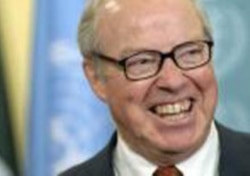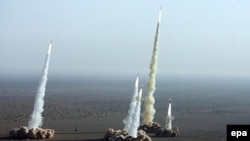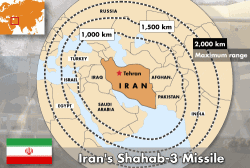RFE/RL: Iranian National Security Council Secretary Larijani reportedly has described the U.S. missile-defense shield for Europe as "the joke of the year," saying Iranian missiles do not have the range to reach Europe. Do Iranian missiles now have the capability to reach European targets from Iranian territory?
Doug Richardson: They do have a capability to hit some of Eastern Europe and southern Russia but not particularly deep into those countries. Obviously, we don't have very solid information on Iran's missiles, they don't release a lot of information but we think that their Shahab-3 has got a range about 1,300 kilometers while it's improved the version of Shahab-3A, it's stretched its length to get some more fuel into the tanks and they've cut the weight of the warhead by more than half; we think that can do up to 1,800 kilometers. Now if you look at the map of Europe, Volgograd is 1,100 kilometers from Iran and certainly Volgograd was in Europe the last time I looked. That sort of narrow range would get you just about to Istanbul; there's certainly no argument that bit of Turkey is in Europe, that's about 1,400 kilometers from just inside the Iranian border. If you move to the longer-range figure (1,800 kilometers), then you get more cities of East Europe starting to come into range. Eighteen hundred [kilometers] will give you Iran to Kyiv, just about Iran to Athens, I suspect, Iran to Bucharest.
RFE/RL: What about Iran's plans to develop longer-range missiles in the future? What kind of range are they trying to develop and how far could those missiles reach from Iran?
Richardson: In order to get to Moscow you would have to get a missile of 2,000 kilometers range. We hear rumors of such developments from Iran but nothing very firm. We honestly don't have any real hard information on Iran's future missile plans, we've heard talk of something allegedly called the Shahab-3B; the story is rather vague. The reports talked about 2,000-2,500-kilometer range. There've been reports [about] Shahab-4 [but] the Iranians have said there is no such thing as Shahab-4. We have seen some pronouncement that there is a Shahab-4 but it's not a missile, it's going to be a satellite-launch vehicle. So there's just no hard information. We know they are doing a lot of rocket development work, 2,500 would not quite get you to Rome, it would probably get you to Zagreb, Budapest, you'd get most of Slovakia, it would get you a bit into the Czech Republic [and] up to Warsaw, Minsk, and not quite St. Petersburg.
RFE/RL: Who is helping Iran develop its long-range missiles?
Richardson: It's largely being done, we think, with help from North Korea. But they are probably becoming much more self-independent and self-supporting. [Iran] needed help to get started with the Shahab, so they worked in conjunction with the North Koreans, who were working on their No-Dong missile program. But [Iran] has probably got enough expertise now to be able to do most of this themselves. Whether there is a fertilization path directly from Iran to Pakistan, that I don't know. I don't think anyone outside the world of the intelligence services [knows].
RFE/RL: What do you think about Larijani's description of the U.S. [missile-defense plan] in Europe as "the joke of the year"?
Richardson: When politicians start talking about "jokes of the year," they are usually making political statements. Obviously, the U.S. Department of Defense must feel that it has credible evidence that Iran is working on much longer-range missiles, or has the capability to develop much longer-range missiles. Otherwise, it wouldn't be developing and putting this amount of money into potential defenses against them.
RFE/RL: Russia has said the U.S. missile-defense shield plans for Europe [are] targeted at the Russian missile system. Do you agree?
Richardson: The U.S. missile-defense shield is going to be a relatively small number of interceptors. It is focused very much on rogue states -- North Korea, Iran, countries that might be able to develop nuclear weapons and a small number of ballistic missiles. The Russians have been complaining recently that they see the plan to put U.S. ballistic missile interceptors in Poland as being aimed at their system.
But the basic laws of geography suggest it is not. Ballistic missiles from Russia being fired, say, at the United States, are going to fly up over the polar region. They are going to go nowhere near Warsaw. So a ballistic missile interceptor fired from Poland would have a very hard time trying to catch a Russian missile because the Russian missile would be traveling at right angles to its flight path. Essentially, the inceptor would be doing a tail chase. It would be trying to catch something that is going faster than it is. It just wouldn't [be able to] do it.
RFE/RL: Do you think the U.S. missile-defense shield plans for Europe are meant to protect Israel and Europe from Iranian missiles in the future, or is it meant more as a protective shield for the United States?
Richardson: The full range performance of the American ballistic-missile [interceptor] system has simply never been released. They have not given any hard figures as to [its] range and height capability. If you look at where the missiles are being deployed, or [where] there is talk of them being deployed, and then start looking at the potential trajectories from Iran and North Korea to the continental United States, then those existing deployments and announced deployment sites make sense. That's what they are aimed to deal with -- attacks on the continental United States of America from either the Middle East and Iran area or from North Korea. If you plot a great circle trajectory -- as navigators call it -- from North Korea to different places in the USA, or from Iran to different places in the USA, you can see that those paths are getting close to the locations where America is planning to deploy its ballistic missile interceptors.
Click to enlarge the image.Security Guarantees For Iran?
 Hans Blix (CTK)
Hans Blix (CTK)
SECURITY GUARANTEES On January 26, RFE/RL Radio Farda correspondent Fatemeh Aman spoke with former UN chief weapons inspector HANS BLIX about the confrontation between Iran and the international community over Tehran's nuclear ambitions. Blix urged the United States to participate in direct negotiations with Tehran and to offer Iran security guarantees that are similar to those being discussed with North Korea...(more)
LISTEN
Listen to the complete interview (about five minutes):Real Audio Windows Media

THE COMPLETE STORY: RFE/RL's complete coverage of controversy surrounding Iran's nuclear program.













